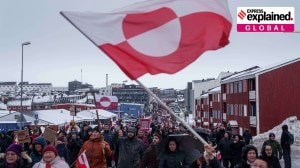Secure the future
8226; While considering energy security 8212; a concern often voiced on your pages 8212; the em...

8226; While considering energy security 8212; a concern often voiced on your pages 8212; the emphasis has been on having assured supply of petroleum products from Indian and foreign sources on a long term basis. It would be more appropriate to consider all the alternative sources of energy available to use to meet our requirement. Since India is not expected to be self-sufficient in petroleum products, their use should be minimised and restricted only to the transport sector and mobile equipment.
8212; Vijaya Singh Ghaziabad
Mid-East dream
8226; Thomas Friedman8217;s column, 8216;When camels fly8217; IE, Feb 21 is thought provoking. An iron veil of anti-Semitism, anti-democracies, anti-minorities and anti-women has descended across the Greater Middle East from Morocco to Pakistan. We, the citizens of world democracies, are well aware of the old tyrannies of the Middle East but their new potential replacements are even worse. The few elections that have take place in the Middle East have returned Islamists, Islamists and Islamists. The camel caravan of pluralistic liberal democracies in the region remains a distant dream.
8212; Arun Khanna Indianapolis
Leveraging exports
8226; Apropos of the article, 8216;Tips on balancing India8217;s budget8217; IE, Feb 22, there seems to be a fallacy. The author makes a case for India running a small current account deficit because imports are more valuable than exports. The higher value to imports is ascribed to the scarcity of goods approach. Since imported goods are scarce and exported goods are abundant, therefore it is better to adopt an import growth policy. This may be true, but the author fails to acknowledge that the value of exports is not solely dependent on its scarcity, but its perceived value to the buyers. This is what the theory of internatio- nal trade and comparative advantage posits. Since the buyers of our exporters are importers in their countries, the value of exports will reside in the exported commodity8217;s scarcity in the buying nation. And if a country is engaged in exporting goods that are in great demand in the global market, policy of export maximisation should be a logical conclusion.
8212; Anant Nath On e-mail
Tricolour logo
8226; The Union home ministry has directed Indian cricket team not to use the Tricolour on their clothing and other accessories while playing in matches. The directive should have been in a reverse manner: the ministry should have made it compulsory to print/emboss the national flag on cricketers8217; uniforms and other accessories like bats, helmets, etc. This would utilise a popular game to propagate national prestige.
8212; Madhu Agrawal Delhi
Democracy, no
8226; Out of the 300 something years history of modern Nepal, 297 years have been without the political parties8230;in other words Nepal have survived and can survive without them 8216;The emperor wears no clothes8217;, IE, February 21. Believe me, life was much better even at the rural areas 15 years back. The statistics you are giving out about poverty and mortality rate, etc, worsened only after the King introduced multiparty system. Had there been Absolute Monarchy all this while like before, we could have easily been as good if not better, than Sri Lanka. If the majority of people of my country, Nepal, don8217;t want democracy, what8217;s your problem?
8212; Bishwa London
- 01
- 02
- 03
- 04
- 05






























